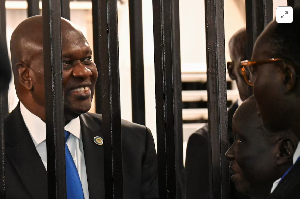Innovation is fast becoming an entrepreneurial catch-all term. From the polished studios of DAVOS to modest lecture halls, the innovation conversation echoes across different spaces hosting the development fireside.
One question often asked is, what is the role of the State in all this? Do we all follow the blueprints of lead States like the USA or can we kick away the ladder of foreign prescriptions and pursue a path that is dynamically bespoke. A path that mimics our intrinsic realities to deliver optimum value to the members of our society who live our realities on a day to day basis.
It is evident that Modern States depend on information and communication technologies to deliver services such as trade, transportation, healthcare, education, justice, protection and much more to their citizens. Notably, in Developing countries, the state is often the largest purchaser of technology, sometimes by orders of several magnitudes in quantum and monetary value. Because of their procurement power, States have a significant influence on the development of the innovation and the technology ecosystem across many economies in the world.
In Ghana, we are not lost for individual examples when it comes to innovation and the mindset to pursue innovation as a viable pathway to economic and social success. The catch is, how we harness and mainstream innovation and technology to transform our country for now and the future. Have we thoroughly interrogated our technology transformation and innovation journey? Do we, for example, have predictable and expected outcomes on our technology transformation adventures? Are our technology transformation and innovation exploits linked to a well communicated national vision? Alternatively, is it the case that we are doing what comes to mind and what is expected, mimicking outcomes experienced by a few been-tos, hoping that we will one day be like those places we deem as benchmarks to how Ghana society has to be?
The real question is, do we have a technology transformation and innovation blueprint?
In a nation whose social fabric and future are knitted with yarns of uneasy politics, I reckon it won’t be an easy task to weave out a technology transformation and innovation agenda on a well-designed blueprint.
In search of a technology transformation and innovation blueprint.
In my view, we live in a world order which makes no room for dogmas and has a consciousness and ultra-high appetite to tear down known and accepted systems. We live in a world that is highly interrogative and continually challenging norms, taboos and disrupting its own beliefs, sciences, and philosophies. We live in a world that is powered by data more than the mights of armies. This new world is naturally selective in a way that favours those who are digitally equipped, knowledge-grounded and technologically fortified in all its renditions. In technology, I am referring to the software and hardware part of man’s technological and innovation experiments. The world is high on the data-opium, and admittedly, it is the necessary evil/good. In God, we trust, for everything else bring data is a familiar mantra many might have heard in different corridors. Ghana is part of this data-aggressive and innovation-oozing world.
Another question is, how is Ghana positioned in the natural selection of innovation and technology evolution?
Increasingly the world is becoming more and more competitive. The is scramble for dominance across different sectors of the global economy. The technology and innovation dominance are playing out aggressively between China and the United States, especially. Beyond the innovation turf war, globally, economies are increasingly seeking their own and aligning towards protectionist socio-economic policies aimed at creating value but with much exclusivity for their citizens. Inadvertently, that is also creating very keen competition among countries. The global political play among nations indicates that our world is approaching a peak on the me-alone crescendo. From Make America Great Again (MAGA) to Brexit to Visa restrictions, we see a world where countries are intoxicated with thoughts of self-preservation and nationalism. More and more, it is becoming difficult for people to pursue economic migration. Ghana as a country is not immune to the exigencies of the new global dynamic. In a sense, soon, Ghana would be stuck with its own. Whether a good economy or bad economy, its people have to stay inside and enjoy it or endure it.
One other question is: is our beloved Ghana able to deliver a great country to its people and make the country a beacon of transformation to the rest of the world through technology innovation?
I say yes. However, how? Ghana needs a National Digital Transformation and Innovation Blueprint (NDTIB). Everything mentioned above underscores how vital this blueprint is to the destiny of our nation.
Subsequent publications will outline how we make the journey towards a full-blown national digital transformation and innovation blue print.
Stay tuned.
Opinions of Saturday, 26 January 2019
Columnist: Derrydean Dadzie















